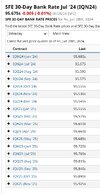- Joined
- 20 July 2021
- Posts
- 12,114
- Reactions
- 16,862
why would the RBA be worried about Illiquidity in share portfoliosIlliquidity in share portfolios will be death.
it knows large amounts are trapped in Super/SMSFs and managed funds , and with ETFs well we will see what happens if they face real pressure
BTW i am NOT saying i approve of the RBA decisions over the last 5 years , but hey they are on a nice salary a pretty good retirement plan , unless the masses come out with pitchforks , only politicians will feel real pain ( the RBA live in Ivory Towers , don't they ?)
i still think at least two hikes by the end of 2025 as even the rubbery figures can't hide the truth ( remember the RBA needs to crush demand ie leave the masses dirt-poor , to beat inflation )





